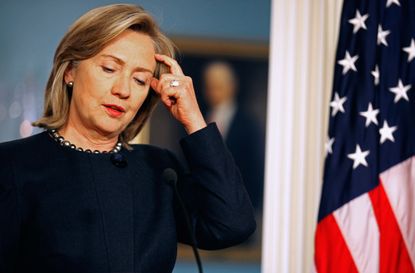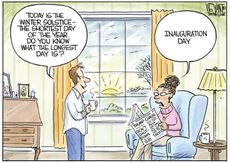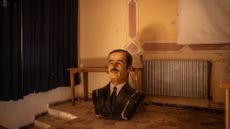Yes, Hillary Clinton should answer more questions. Let's just ask the right ones.
"What about your gaffes?" doesn't qualify


Republicans are displeased with Hillary Clinton, you'll be shocked to learn.
The focus of their current ire is the fact that Clinton has not given any interviews lately or taken questions from reporters. Her campaign events are few, and when they do occur, they're in tightly controlled situations. The GOP candidates have come up with a novel way to spotlight this.
More and more, they're not only criticizing Clinton for not taking questions, they're counting up the questions they themselves answered. The idea is that this provides empirical evidence of how free-wheeling and open their campaigns are and how Clinton is a fugitive from the enlightening glare of the media.
Subscribe to The Week
Escape your echo chamber. Get the facts behind the news, plus analysis from multiple perspectives.

Sign up for The Week's Free Newsletters
From our morning news briefing to a weekly Good News Newsletter, get the best of The Week delivered directly to your inbox.
From our morning news briefing to a weekly Good News Newsletter, get the best of The Week delivered directly to your inbox.
Carly Fiorina may have been the first, but now even Jeb Bush is getting in the act:
"I asked someone to kind of add up the questions that I've been asked by people who can ask whatever they want, and of course the press that follows me around from time to time," Bush said at a town hall in Dubuque, Iowa over the weekend. "And we're probably around 800 to 900 questions asked and hopefully answered.""Just as an aside," Bush added, "Hillary Clinton has been a presidential candidate for a month maybe, and she's had 13 questions asked by the press." [The Washington Examiner]
Lest you think Clinton's allies are taking this criticism lying down, I can report that I got a helpful press release Monday from pro-Clinton organization Correct the Record, detailing every question Clinton has asked voters she has met. It's riveting stuff:
"So we're in your classroom?" she asked a student at a community college in Iowa.
"What are your hours of operation?" she inquired of a business owner in New Hampshire.
"Do you want to share your story?" she asked another student in Nevada.
And yet people say politics is boring.
Reporters, the ones being spurned, are also growing perturbed. They're keeping track of the days it's been without a question (see here or here), and beginning to write stories on What It Means. Maggie Haberman of The New York Times, playing political consultant (every campaign reporter's secret wish), offers up a strategic assessment of what the consequences might be:
Mrs. Clinton, who has campaigned lightly in what aides have called a 'slow ramp-up,' can’t afford to appear as if she is taking things for granted. And she has historically needed a long runway in her campaigns, but the longer she goes without taking reporters' questions, the less recovery time she has from any mistakes. [The New York Times]
That's an odd thing to say, given that the election is over 17 months away. The obvious reason Hillary Clinton should take questions from journalists isn't that it's a political risk not to or that she might not make mistakes, it's so that the public can understand more about what she thinks and what she wants to do if she's elected.
Unfortunately, much of the time that's not what reporters are after. Look what happened with questions about the Iraq War over the last week or so.
It started with a perfectly legitimate question seeking to understand Jeb Bush's perspective on the worst foreign policy disaster in American history, but quickly devolved into a floating game of "gotcha," with every GOP candidate getting asked the question "Knowing what we know now, would you have invaded Iraq?" Each candidate's answer was then inevitably parsed, not for substance, but for hypocrisy and the tiniest of deviations from the other responses.
In the process, we gave up an opportunity to explore what each of these people learned from the experience of Iraq, and how it changed their thinking about foreign policy and the use of the military. (It also perversely resulted in candidates being allowed to propagate myths that the war happened because of "faulty intelligence.") So what you end up with is interviews like the one Chris Wallace did with Marco Rubio Sunday, where they go back and forth on the meaning of the word "mistake," to no one's edification.
It's not entirely reporters' fault; with precious little access to candidates, they can end up feeling like they have to make every question count, which creates an impulse to engineer a dramatic moment. At its most pathetic, that situation can produce a reporter futilely shouting "What about your gaffes?" at the candidate as he gets into his car, pretending not to hear.
Part of the problem is that we perceive questions that have a tinge of hostility or seem designed to catch the candidate in a contradiction as inherently "tough," and that's what reporters are supposed to be. But you can be tough in that sense yet completely let the candidate off the hook. After all, evading difficult questions is what they're good at.
The most useful questions aren't necessarily the ones that will make the candidate most uncomfortable or are the hardest to answer without making someone mad, they're the ones that reveal the substance of the candidate's perspective on the world and what he or she would actually do as president.
So by all means, we should keep pressuring Hillary Clinton to answer questions from reporters. Let's just make sure that when she finally does, the questions we have aren't so trivial.
Sign up for Today's Best Articles in your inbox
A free daily email with the biggest news stories of the day – and the best features from TheWeek.com
Paul Waldman is a senior writer with The American Prospect magazine and a blogger for The Washington Post. His writing has appeared in dozens of newspapers, magazines, and web sites, and he is the author or co-author of four books on media and politics.
-
 Today's political cartoons - December 22, 2024
Today's political cartoons - December 22, 2024Cartoons Sunday's cartoons - the long and short of it, trigger finger, and more
By The Week US Published
-
 5 hilariously spirited cartoons about the spirit of Christmas
5 hilariously spirited cartoons about the spirit of ChristmasCartoons Artists take on excuses, pardons, and more
By The Week US Published
-
 Inside the house of Assad
Inside the house of AssadThe Explainer Bashar al-Assad and his father, Hafez, ruled Syria for more than half a century but how did one family achieve and maintain power?
By The Week UK Published
-
 US election: who the billionaires are backing
US election: who the billionaires are backingThe Explainer More have endorsed Kamala Harris than Donald Trump, but among the 'ultra-rich' the split is more even
By Harriet Marsden, The Week UK Published
-
 US election: where things stand with one week to go
US election: where things stand with one week to goThe Explainer Harris' lead in the polls has been narrowing in Trump's favour, but her campaign remains 'cautiously optimistic'
By Harriet Marsden, The Week UK Published
-
 Is Trump okay?
Is Trump okay?Today's Big Question Former president's mental fitness and alleged cognitive decline firmly back in the spotlight after 'bizarre' town hall event
By Harriet Marsden, The Week UK Published
-
 The life and times of Kamala Harris
The life and times of Kamala HarrisThe Explainer The vice-president is narrowly leading the race to become the next US president. How did she get to where she is now?
By The Week UK Published
-
 Will 'weirdly civil' VP debate move dial in US election?
Will 'weirdly civil' VP debate move dial in US election?Today's Big Question 'Diametrically opposed' candidates showed 'a lot of commonality' on some issues, but offered competing visions for America's future and democracy
By Harriet Marsden, The Week UK Published
-
 1 of 6 'Trump Train' drivers liable in Biden bus blockade
1 of 6 'Trump Train' drivers liable in Biden bus blockadeSpeed Read Only one of the accused was found liable in the case concerning the deliberate slowing of a 2020 Biden campaign bus
By Peter Weber, The Week US Published
-
 How could J.D. Vance impact the special relationship?
How could J.D. Vance impact the special relationship?Today's Big Question Trump's hawkish pick for VP said UK is the first 'truly Islamist country' with a nuclear weapon
By Harriet Marsden, The Week UK Published
-
 Biden, Trump urge calm after assassination attempt
Biden, Trump urge calm after assassination attemptSpeed Reads A 20-year-old gunman grazed Trump's ear and fatally shot a rally attendee on Saturday
By Peter Weber, The Week US Published